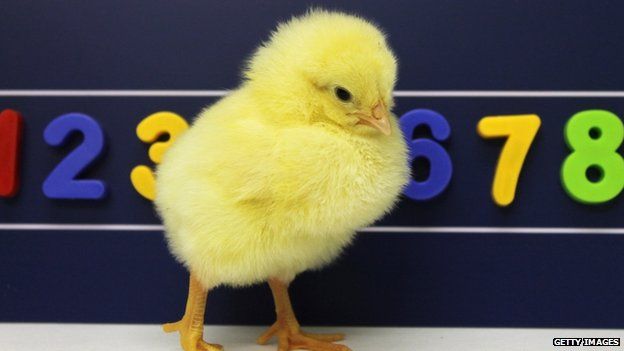Shortage of chicken sexers in UK despite £40,000 salary
- Published

Britain is experiencing a shortage of chick sexers.
Despite offering a salary £40,000 a year, the British Poultry Council is finding it hard to recruit people who are able to check the sex of chicks.
A harder look at what is involved may reveal why.
Chick sexers spend their days looking inside the bird's anuses to see whether they are male or female. Chick's anuses are referred to as vents - just in case you wanted to know.
Sexers delicately squeeze a little poo out of the chick to open the vent then look inside and check for a bump. That means it's male.
They are usually paid £3 per 100 chicks examined and examine around one to 1.5 million per year.
Farmers need to check whether they are male or female so they can be sorted and reared appropriately, with the males used to provide meat and the hens to lay eggs. Sometimes the males are discarded.
Andrew Large from the British Poultry Council says it is an incredibly skilled job that could never be done with a machine.
It takes three years of training to be able to do it properly, but people don't want to stay that long.
Mr Large told Newsbeat that it would be a great job for young people.
"There is a career ladder from apprenticeships and on the job training right the way to post-graduate level work.
"It can provide a lifetime of employment. The salary is also an attraction, as well as the opportunity to work with animals, to ensure their welfare and to play a part in feeding the nation."
However, he did acknowledge that "spending hours every day staring at the backside of a chick" is not seen as being attractive.
"In south-east Asia, a chick sexer is a high status job. In the UK it is more likely to be the butt of humour."
Chicken sexer isn't the only farming job you may not have heard of.
Other unusual farming jobs include:
Worm picker
In Canada, you can earn a bit of extra money worm picking. If you don't mind crawling across muddy fields and scooping up creepy crawlies into a cup that is.
Worms are needed as lures for fishermen. The worm pickers go out on warm wet nights, shining torches onto the ground and plucking up as many as 1,000 worms an hour.
Deer urine farmer
Another special job. Deer urine is packed full of natural chemicals which attracts other animals and works as a lure for game hunters.
At Mrs. Doe Pee's Buck Lures in Iowa, it works like this: the deer lie on grates all night, allowing their pee to drip down and collect in steel vats underneath.
It is then collected in the morning. It's a seasonal job though, to some extent.
There is more pee in the summer time as the animals drink more.
Rotten egg sniffer
These people crack eggs, separate the yokes from the whites and throw bad eggs away. Boring, smelly and wet.
Snake milker
These people extract venom from snakes to help scientists develop antidotes and other medicines.
A snake farm is called a serpentarium and these facilities employ snake milkers to extract venom by carefully coaxing a snake to bite down on a rubber-covered glass. The venom will run down the fangs and into the glass.
It's dangerous. Snake milkers can't wear gloves as they have to grip the snake tightly and respond to its movements and it's hard to feel through fabric.
Lots of snake milkers have been bitten.
Enough to put any office job in perspective.
Follow @BBCNewsbeat on Twitter, BBCNewsbeat on Instagram and Radio1Newsbeat on YouTube